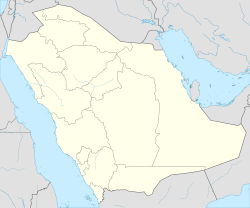Miʼkal (Riyadh)
Maʼkal
معكال | |
|---|---|
| Coordinates: 24°37′22″N 46°42′53″E / 24.62278°N 46.71472°E | |
| Country | Saudi Arabia |
| City | Riyadh |
| Government | |
| • Body | Baladiyah Al Batha |
| Language | |
| • Official | Arabic |
Miʼkal or Maʼkal (Arabic: بلدة معكال, romanized: baldah Maʿkāl, lit. 'Maʼkal township') is an ancient village and a historic neighborhood[1] in southern Riyadh, Saudi Arabia, located that is a subject of Baladiyah al-Batha[2] in southern Riyadh, Saudi Arabia, located between ad-Dubiyah and al-Wusaita.[3] The town came into existence when Hajr al-Yamamah[4] disintegrated up into several settlements and estates in the 16th century (10 AH), the most notable of them being Migrin (or Muqrin) and Ma'kal.[5] Its name reportedly comes from two pre-Islamic Arabian deities, Kāl and Maʿkāl (Arabic: كال ومعكال) that were worshipped in Najd.[6]
History
[edit]The town came into existence when Hajr al-Yamamah[4] disintegrated up into several settlements and estates in the 16th century (10th century AH), the most notable of them being Migrin (or Muqrin) and Ma'kal.[5] It was reportedly named after two pre-Islamic Arabian deities, Kāl and Maʿkāl (Arabic: كال ومعكال)[6] that were worshipped in Najd.
According to historian Abd al-Malik ibn Husayn al-Isami al-Makki, Maʼkal was also the site of a military conflict when it was besieged in 1578 (986 AH) by 50 soldiers of the Sharif of Mecca Abu Numayy II[7][8] in which he killed several of its political leaders and imprisoned others for almost a year until they agreed to pay concessions.[5]
References
[edit]- ^ "أحياء الرياض القديمة.."التاريخ" حفظ الأسماء و"الحاضر" أهمل الأماكن!". Al Riyadh (in Arabic). 2010-06-04. Retrieved 2021-06-07.
- ^ "الإدارة العامة للنظافة". archive.md. 2015-04-19. Archived from the original on 2015-04-19. Retrieved 2021-11-20.
- ^ "جولة في حي الدوبية". Al Riyadh (in Arabic). 2020-10-29. Retrieved 2021-11-21.
- ^ a b "al-hakawati - Riyadh". al-hakawati.net. Retrieved 2021-11-21.
- ^ a b c "بلدة معكال من بلدات الرياض القديمة". Al Riyadh. 2008-05-30. Retrieved 2021-11-21.
- ^ a b "شيء من تاريخ نجد". Al Riyadh. 2004. Retrieved 2021-11-24.
- ^ "الكتاب : سمط النجوم العوالي في أنباء الأوائل والتوالي". islamport.com. Retrieved 2021-11-21.
- ^ "ضرب الهنادي بين مقرن ومعكال". Al Riyadh. 2012-02-02. Retrieved 2021-11-21.


